#has a less important role and interacts with other characters
Explore tagged Tumblr posts
Text

Sorry this is the most annoying type of niki fan ever. I saw this post 5 days ago and I'm still mad about it
#shay speaks#not main tagging but also i blocked the op so they wont see this#i was talking to lis abt this as well and its so. sorry you cant dig just a little deeper w him#he has plenty of development in stories if you mean backstory then say it#but also you dont need a huge backstory to make a good character#niki is plenty fleshed out if you think about his mannerisms and such#sry i was in a discord w someone like this and got into so many arguments w them too#like idk how to tell you sometimes you should read other stories where niki#has a less important role and interacts with other characters#and youll see the beauty of his character in full
2 notes
·
View notes
Text
I don’t like minimizing the importance and gravity of Laios and Toshiro’s fight into just being a childish squabble, even if to a degree it is framed that way, because to both of them it has a lot of personal significance and emotional weight and runs very deep to their characters… The fight isn’t nothing it’s a LOT, they made up but it’s not something easy to express and to get over for either of them which makes it all the more meaningful! I’m on both sides but there very much are sides, there’s no "they’re both having a ball, Toshiro and Laios hand in hand yay" side to the fight, that comes after
The fight with Toshiro WAS very scary to Laios, almost existentially so, but it’s moreso the "I thought I’d made a friend!!" bit and my god. My god actually
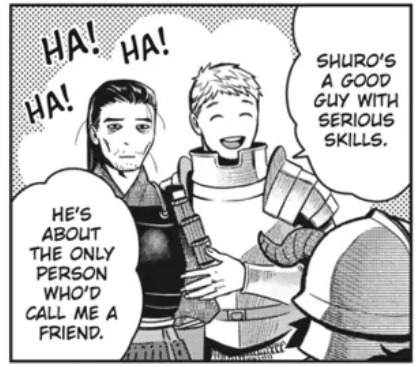
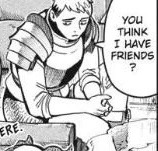
Like it’s not "just" about oh his friend liking him less than he thought, THAT IS SO MUCH. It’s a bond he thought he had being a lie it’s all the time and moments spent together either being a lie from his perspective or marred now looking back. It’s not only being upset at Toshiro for lying but upset at himself that he’s so easy to fool, it’s being upset that there’s something so wrong with you that you can’t even tell if your "close buddy" even actually likes you or not, it’s like. Holding my head. He can’t trust his own vision of events that happened do you see. There’s always this film of distrust that it could be a lie that should be there when he interacts with people there’s always this sense of cloak and dagger to expect backstabs out of nowhere because you CAN’T see it coming you CAN’T you CAN’T there’s something about you which makes it impossible so you CAN’T-

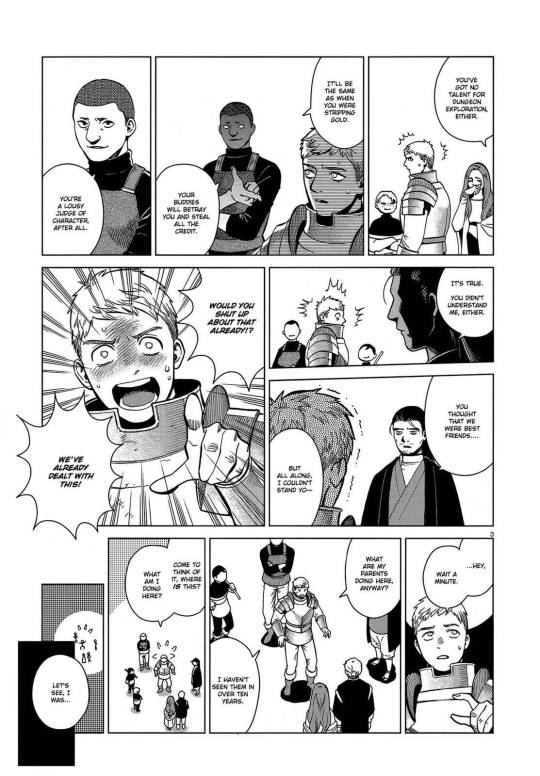
He’s so scared of not being able to read people. He knows it’s a weak spot he has, he’s always known. All of these bits are centered around social expectations and betrayals, the assumption that he doesn’t belong either in society or with other humans.
And Laios’ level of awareness is actually sort of complex to analyze, but it’s there, there’s how out of him and Falin he was the one sensitive to the ~aura of hatred~ he felt from the townspeople, there’s of course his nightmares whispering to him about the mocking looks, and how yeah actually he realizes that his gold stripper coworker was taking advantage of him. There’s of course the Winged Lion speech about his trauma and how he fundamentally mistrusts/dislikes humans to some deep seated degree, this distrust that he still keeps under control always. There’s how pre-canon he often wanted to suggest eating monsters but never worked up the courage to bring it up with the others. There’s how he gets across as stoic when he isn’t being enthusiastic…… We don’t know how aware and wary he is exactly in the moment but we do know he has some anxiety around social stuff, and looking back he does notice and aughh augh, the sense you have to hide yourself to not get hurt and be on your guard and shit and.
When you don’t know what to look out for and when to look out for it, the general ‘common sense’ of not always trusting people or noticing when someone’s messing with you becomes hypervigilance in social settings
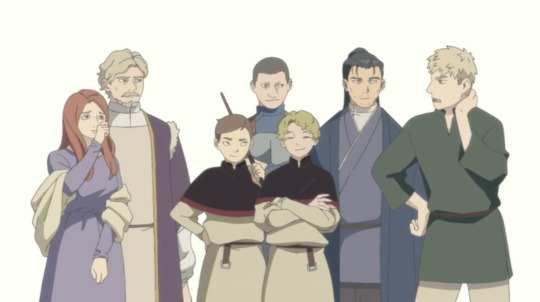
"Man they really know what you hate huh." Being socially unaware literally plagues him, he knows, he knows it so well.
It’s so quick that it’s almost hard to digest how literal and blatant Laios summoning his monster to crush all the people who’ve hurt him is. His literal go-to coping mechanism for comfort in his literal monster-induced emotionally intense nightmares, saving him by taking away the upsetting element (the humans)
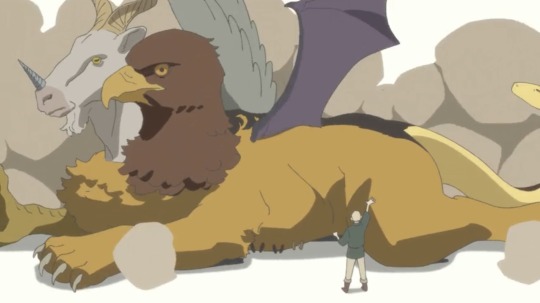
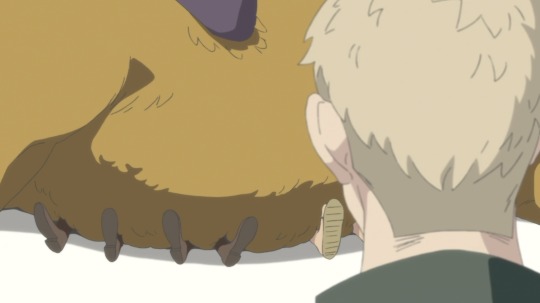
"Monsters are his coping fantasy, where they can whisk him away from humanity, all the hurt it’s caused him and its arbitrary rules" with the subtlety of a brick. Monsters are his comfort safe zone "because they kill humans" yes but no it’s because he pits them as the guardians against humans who to him are in the role of the agressors. To him they represent freedom from the shackles of what it means to be part of humanity, a fundamentally social species
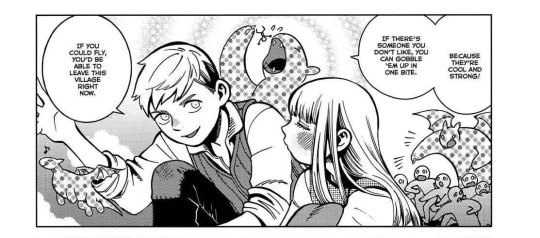
#Fumi rambles#Was asked to post this but a lot of this is present in my shuro-Laios fight analysis from Laios’ pov#Bite sized fumi#Laios touden#Meta#happy nightmare chapter day#Character analysis#Spoilers#dungeon meshi manga spoilers#And humanity being a social species is ofc ultimately not shown as a negative.#Dunmeshi is about unity and coming together when seeking to understand that which you do not!!!#But yeah like imagine if you will that you can never really trust your own perspective of events because you literally can’t tell#Wether the person likes you or hates you and you just can’t tell. Even when they ARE being obvious about it#The nightmare scene is so real like I def have vivid memories where I’m like ‘Ah yeah they cringed here#that should have been a dead giveaway’. It wears on self-esteem and self-trust. Like “you don’t belong in society” in a way they’re#sorta like factually not wrong and like. Oh ok man. Sitting down#Just spitballing here obvi. Personal experience. Hey did you guys know that dunmeshi is good. Man. It’s good#Dungeon meshi#Analysis#Feeling The Owl House Gus meltdown episode in tha club tonight#Sobbing about how the flashbacks we see of Laios’ childhood are only happy when it centers around Falin or the dogs
635 notes
·
View notes
Text
U don’t understand. He’s a Nindroid. He has a soul. He has ice powers. He’s TRAUMATISED. He does not value his own life. He is borderline suicidal. He is SOFT. And he loves people too much. But OUgh he’s actually a little fucked up even tho he’s calm and calculated Caus he toucheda forbidden stick and it made voices in his head and then he was like a genocidal murderer for like 60 years and he had no memory of anything and then he was dragged out of that situation and nobody even asked if he was ok and he never questioned that because he’s lived his whole life with the expectation that he’s fine and he’s got everything under control and he doesn’t even know what mental health awareness is because no one ever talked to him about it because no one ever asked if he was okay, not physically but mentally. Because even if people cared no one ever thought he was not okay, and so Zane never thought he was not okay so he’s lived his life for probably a hundred years or so by now, always moving forward and never addressing his problems or traumas or demons, which is DESTROYING HIM, from the inside out. He has absolutely NO SELF WORTH. His entire existence is based around his role as a ninja, he has been trained from when he was a “teenager” that his worth is based around his ability to preform, that the most important thing is to save lives and the world and stuff. Which it is but like he’s never been allowed to do anything else and on the rare occasions he and his friends relax they immediately get scolded and told to keep fighting. He’s never had a sick day. He literally sacrificed himself to save the world. He rebuilt himself, and immediately the next opportunity he gets, he sacrifices himself again, and he tries to do that over and over and over again because that’s his job he states that he is expendable! He says that multiple times. He always volunteers to take the hits because his view on his humanity his person hood is so WARPED, that he believes he has less value than a human. That he is a TOOL. To be used by those around him because people sure, they’ve treated him with kindness on many levels but it’s kind of shallow when they never care enough to prevent him from getting hurt, they use him, he almost dies, they fix him and then put him back into the line of fire. His entire worldview is based on fighting.
The only person. Who has ever asked if he is okay and treated him like a human being. Is a STUPID GOSH I LOVE HIM BUT JES SO DUMB. FROG MAN and Zane is SO NOT USED TO IT that he has to repeatedly inform. This man. That he is in fact. A robot. Because he expects that to change the way people interact with him. He’s a machine, he doesn’t need a break, he’s built to serve a purpose. But frog man, does not listen.
Frog man is kind, frog man is good.
FROHICKY TRIES TO PLEASE ZANE SO MUCH THAT HE GIVES ZANE A FROHICKY PLUSHIE. SO THAT ZANE CAN VENT HIS FRUSTRATIONS AT THE PLUSHIE. SO THAT HE WILL FEEL BETTER. AND ZANE SAYS “I do not experience heightened emotions.” see see this this proves one of my points urghhhguugh FROFFS BARKS GROWLS HE DOES. WE ALL KNOW HE DOES, ANY NINJAGO FAN WITH EYES CAN SEE THAT ZANE EXPERIENCES HEIGHTENED EMOTIONS. HE JUST KEEPS FUCKING LYING TO HIMSELF AND OTHERS BECAUSE HES GOT THIS ROBOT MINDSET EVER SINCE SEASON 3 HES JUST BEEN ENTIRELY CONSUMED BY THE IDEA THAT HE ISNT HUMAN AND SO HE HAS TO BE DEFINED BY THAT IDEA. He has so many inconsistencies all relating to this weird brain he has this weird weird robot brain it’s SO INTERESTING. I WILL BE GATHERING INFORMATION AND I WILL BE MAKING A FULLY RESEARCHED FULLY COHERENT RANT ABOUT ZANE IN THE FUTURE. BUT RIGHT NOW I HAVE OTHER STUFF TODO BUT URGHH THIS CHARACTER MY BRAIN IS TINGLING SO MUCH URGHH
#ninjago zane#lego ninjago#ninjago#zane ninjago#zane julien#zane julian#ninjago dragons rising#Just my hyperfixated thoughts and rambles I thought I’d dump in tumblr not all of it is fully coherent but OUgh it’s so juicy#I know a lot of the people who read this will understand me
202 notes
·
View notes
Text
Thinking about the role of the "love interest" in superhero media and how poolverine subverts this.
The "love interest" in most movies is just a placeholder. Boring. Tame, Predictable.
This is especially true in action media, wherein romance takes a backseat and is often seen as an add-on rather than a main plot point. Romance is either a source of conflict or motivation that serves to drive a character arc forward, but no more or less.
Take, for example, Vanessa. I love her character. Her personality and character are fascinating. However, especially in Deadpool 2 and 3, she serves more as a device to move the plot forward rather than a genuine character. The first movie established her character and importance, so it's understandable why Wade chose to hide his identity and how he slowly came to terms with his new identity. She helped move his character arc of self-acceptance forward, yes, but she also existed as her own entity.
In the movies after this, she isn't treated with the same care. She's used as a central motivation in Deadpool 2, a force that drives Wade to save Russel and confront Cable when his character motivations aren't easily tied to morals. However, that's it. She isn't fighting alongside him or given the same treatment as the other important "family" characters. In Deadpool 3, she's treated with even less care, only having short scenes at the beginning and end of the movie to give Wade a representation of "home."
This isn't to say Vanessa isn't an important character and shouldn't be treated as such. However, the purpose of having a "love interest" in an action movie's plot isn't just to have someone to love. It's almost always to have someone who can be kidnapped or killed to spring the main character into action. It's someone who fades to the sidelines so the main character can show off while showcasing their relationship success.
Consider this: in all of the Marvel comic universes, Deadpool and Wolverine have had many different partners. Different names, different faces. It's common for the "love interest" of a superhero to be seen as an accessory that changes shape depending on the comic artist or franchise. After all, they don't need a cohesive identity to serve their purpose as a "general, digestible reason for the main character to act."
Everyone understands how love can cause people to do crazy things. There is no further elaboration needed, even for morally grey or black characters. It's an easy way to make an understandable motive for the audience. Suspension of disbelief.
And yet, the superheroes remain the same. They get to keep their identity throughout different media. It's always Wolverine and Deadpool. Logan and Wade. Even if they have slightly different plotlines, their core characteristics and intrinsic identity are constant.
Logan could have Jean Gray. Or Mariko. Or Silver Fox. He can have anyone play the role of "love interest," a role that can be shapen by a ball of clay and changed entirely to fit the narrative.
But his "rival" and "best friend" in the multiverse will always be Deadpool. They're notorious for being referenced in each other's media. For fighting. For working together. They are A Set.
This is why I'm so much more drawn to Poolverine than other ships. Wade has different love interests depending on the media type. So does Logan. I can't tie in knowledge from different interpretations into the romance because the love interests are fluid. But with each other, they interact in almost every universe. Have a consistent bond. A "standard." They're soulmates, in a way, forever destined to meet and be important to each other.
This is setting aside how female love interests are treated in male-oriented media in general. They're normally seen as someone to be protected, to stay at home, and welcome back the hero when they return. Some are allowed to be strong, to have abilities, but rarely ever do they stand on equal footing with the male main character. Not where it matters.
This is exhibited in both Wolverine and Deadpool's movies. Vanessa is introduced as a "badass," someone who's part of the underworld and knows how to fight, yet she's often placed in the damsel in distress position. She could match Wade before his mutation, maybe, but after he dons the mask and becomes Deadpool, his work is over her pay grade. The same happens with Mariko in the Wolverine movie: she's initially introduced as someone who can fight, but Logan ends up protecting her almost entirely and is responsible for rescuing her from her kidnapping at the end.
It creates an emotional rift between the side of the "hero" and the side of the "love interest," because it feels like they aren't fighting together for the same cause. It feels like the love interest is treated more as a "reward" for the hero to come back to after saving the world rather than a person.
When the entire movie follows the perspective of the main character as they fight, and action scenes are primarily used to invoke emotion, it feels lackluster to have the love interest stay at home. The most intense moments of emotional connection are typically portrayed between the hero and someone else who understands their suffering who they're trying to reach, such as a villain or rival or friend.
Love interests are never on the same "playing field" as the main character and thus can't relate to their struggle. The director tells the audience that they should be happy or sad when a love interest is on screen, but they don't show the same level of emotional depth when the main point of an action movie is action. The entire premise of the main character is action, and yet the love interest is absent from it. Or a victim rather than a player.
This is why Poolverine subverts this trope. You have two people, each with their own franchise and life. Each with their own skills. Each with similarly powerful abilities.
They are equals and are treated as such by the narrative. They take each other seriously and have an emotional connection because they understand each other's suffering. They both are out on the battlefield, fighting the same war and overcoming their differences. They both are allowed to have "cool" scenes and "sad" scenes and "funny" scenes. They both are given the spotlight to experience character growth and have their own unique internal conflict because they both are strong characters who are narratively important.
They both have chemistry. Which is nearly impossible to attain when the love interest isn't even in the lab.
#poolverine#deadclaws#deadpool 3#deadpool and wolverine#deadpool movie#kitkat#logan howlett#wade wilson#wade/logan#wade x logan
228 notes
·
View notes
Text
Nana Komatsu, the fear of loneliness, and the perfect tragedy of her story
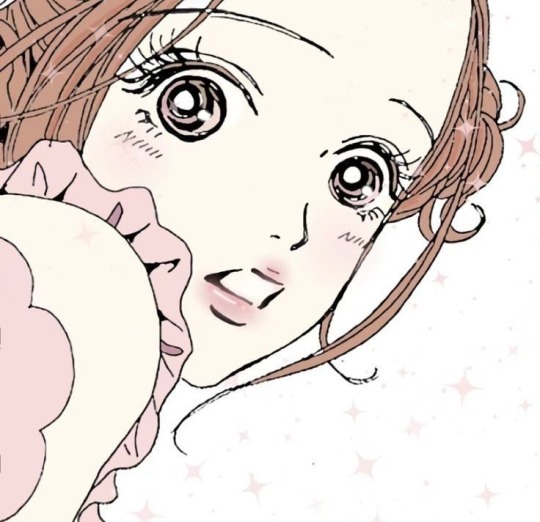
Within the Nana fandom, it is a widely acknowledged fact that Nana Komatsu ( who I will be calling Hachi for convenience) is written and portrayed as a clingy and needy character. Naturally, the effect that such a personality has on the viewers varies, with some enjoying and even empathising with Hachi, while others feel less inclined to such character archetypes, or even real life people, for a plethora of different reasons.
However, I believe that while this aspect of her personality is often highlighted, it plays a much deeper narrative role than it is given credit for. What may initially have seemed like a benign and overused personality trait — Hachi’s need for connection — actually plays a much larger role in shaping the course of her life, and understanding her relationship with loneliness and attachment allows for a greater understanding of her decisions within the anime and manga ( understanding not justification)
To do this we must examine how Ai Yazawa chooses to present Hachi to us, the viewers, in the first few episodes / chapters, and why. Hachi from the get go is depicted to be boy crazy - a girl with her head in the clouds. Someone who is quick to endear herself to others, and even quicker to idolise them - she is a character that wholeheartedly indulges in and thrives off love and attention, even if it is at the expense of her own wishes and dignity (will elaborate). We follow Hachi through her intense attachments - from her art teacher, to the pizza delivery boy, to the guy in the shop, to Asano. Out of all these attachments, we think we can see a recurring theme - they are all of romantic nature, and showcase Hachis constant search and desire to be loved. And yet there is a character whose interactions with Hachi are even more telling of Hachi’s priorities, and which I think is often undermined in the fandom due to the focus of Hachi's romantic pursuits, yet crucial to the foreshadowing and understanding of Hachi’s character and story.
Junko. We see a bond established between them right at the beginning of the anime/manga, while we're still getting to know Hachi, which serves as a key foundation for her characterisation. Hachi follows Junko to art school simply because Junko went. We observe as Hachi interacts with Junko, seeking advice,comfort and security from her, while also allowing herself to be condescended and even embarrassed by Junko. An example of this is when Junko tells Shoji and kyosuke as soon as Hachi meets them that she is loud and has a long history with men. While these traits aren't inherently negative, in the context of the society and time the manga is set in, they were not viewed as favourable traits for women. Hachi's initial protests at having these aspects of her life exposed are telling. Junko can tend at times at the start of the story to be very brisk and sometimes even outright insensitive to Hachi. Yet, when Junko decides to go to Tokyo, Hachi tearfully begs her to stay, even diminishing Kyosuke's importance to his face in an effort to keep Junko close. Realising it would be unfair to hold Junko back from her dreams, Hachi impulsively decides to apply to schools in Tokyo as well. She had no money, no set career aspirations, and no solid plans, yet was adamant to join her friend.
And this brings us to the key aspect of Hachi’s character that Ai Yazawa informed us of from very early on: she will uproot her whole life in order to not be alone. And this trait is depicted throughout all her relationships, platonic and romantic. Hachi may be boy obsessed, but to diminish her later actions to just that is a disservice to Ai Yazawa’s writing skills, as in these pivotal few scenes, Hachi’s past and future link and meld together immaculately - Hachi’s decision to stay with Takumi was foreshadowed and hinted at phenomenally from the very start of the story through Hachi’s past, and how it shaped her interactions with other characters. Her actions were rooted more in a desperate need for companionship and fear for loneliness than, as some people believe, a habit of putting her romantic relationships on a pedestal - and Ai Yazawa has reminded us of this throughout the story.
Hachi grew up in a loud and rather indifferent household where she grew up ( as a middle child) thinking that her absence would just mean less noise in the household, a thought probably encouraged by her parents' passive and impartial approach to parenting and her growing up, giving her an excess of freedom instead of the attention Hachi desired growing up. Given such an environment, she developed an anxious attachment style, clinging onto whatever relationships she has in order to avoid feeling lonely and isolated, such as her friendship with Junko. She compares the feeling to be worse than Asano breaking up with her - the moment when she realised the extent of her unrequited love and the fragility of relationships, causing her to come to terms fully with the threat of loneliness and abandonment. This concept and revelation seems to haunt her visibly throughout the first few episodes, and more insipidly years later as she still seeks companionship and intimacy to avoid the depression and fear she feels when encountering the emotion that she has correlated with feeling unwanted and used.
So given this, it makes Hachis decision to stay with Takumi even more painstakingly in line with her character. Hachi is not written to be a perfect character for readers to project their own morals into - Hachi is young, still rather sheltered and unsure of her place in the world. She thrives off others' reassurance and the security they provide her - when she feels this is being threatened ( such as when she saw Nana interact with Tsuzuki) she spirals. So when she found out she was pregnant, Takumi very intentionally divulged the information without giving Hachi a chance to prepare, recognising Hachi’s intense aversion to being alone, and exploited it in the scenario to fit his interests in keeping her by his side. Hachi was at this part of the story in a very vulnerable and insecure position. She feared and expected rejection and disappointment from her friends, a reflection of her own and society's negative and sexist feelings on her situation, and saw herself as alone. Blast was excelling and becoming increasingly busy, Junko and Kyosuke were occupied in their own daily lives, and she saw herself with nobody to turn to for help or support, and was too ashamed to ask for it from people she held in such high regard. She believed she had nobody who could give her the stability and comfort she has sought for consistently throughout the manga/anime in her friends and romantic partners.
Nobody but Takumi. Hachi knew she would not be happy. She knew that she did not love him and was not loved the way she always idealised. She knew that by marrying Takumi and raising the child with him she would be sacrificing her friends’ trust and opinions of her, and putting herself in a situation that may seem like what she always wanted ( financial stability and a family) , but was less than ideal in reality. But she ended up marrying Takumi - because she believed Takumi at the time was the only one who would accept her, who would not be any more angry and disappointed at her than she was with herself. She saw him as the only option that guaranteed the security she yearned for and seeked in every one of her personal relationships, even at the expense of her own happiness and friendships - and this because we are shown time and time again that Hachi would rather uproot her life than be on her own. She would rather suffer a person and learn to love them than be without. And that is the painstaking tragedy of it all - it makes sense for her character.
Ai Yazawa does a beautiful job at showing the very human side of personalities and relationships. Personal growth is not a linear process, and while Hachi shows moments of self-awareness and even growth, with instances where she is shown slowly blossoming into a more independent woman and recognising her self-destructive tendencies, she ultimately gravitates towards what is most familiar to her. She acts seemingly as a survival instinct, where the pale mockery of a loving relationship seems more plausible and tolerable to her than the shaky and unpredictability of her future, and facing the shock and hurt of those who she holds so dear to her heart. Though this may frustrate viewers, it is also what makes Hachi such a compelling and relatable character — her choices, while flawed, feel deeply human. Hachi doesn’t always make the smart decision, nor the one best in the long run. She is a character that displays the more uncomfortable sides of human nature and actions, and is a character that can be simultaneously loved and sighed at and learnt from, which is infinitely more educational and enjoyable than a character who has things just happen to them. She is a culmination of her past experiences and how she operated through them and processed them is translated and depicted through her relationships and actions in a realistic, though heart wrenching fashion.
#nana#nana osaki#nana komatsu#nana anime#nana and hachi#takumi#ren honjo#anime and manga#anime#anime analysis#analysis#character analysis#manga#shojo anime#shojo#nana manga#show analysis#anime gif#manga nana#manga analysis#media literacy#romance anime#nobu nana#yasu nana#reira nana#nana fanart#ai yazawa#nana hachi#hachi#hachiko
293 notes
·
View notes
Text
One mistake that is very common for communists to make (both online and offline, though it's more annoying online) when talking about and participating in trade unions is forgetting both your and the union's place in class struggle.
A trade union is by its very nature a reformist entity that fights partial struggles at best and reinforces the state's management of capitalism at worst. The purpose of any trade union is to represent a group of workers at the a company or sector at the same level of the capitalists who run it to achieve better conditions for the workforce. Two crucial aspects of this are (1) that it simply puts the workers at the same level of capitalists to negotiate, it does not question the very role of the capitalist in the wider economy, and (2) its ultimate goal is always to reform the contract that defines the relationship between the worker and the capitalist, not to remove it altogether. It does not matter the amount or length of strikes the union might organize, or how much they embolden workers to act in their (supposed) interest. Every fight organized by a union is, by definition, reformist. The only situations in which unions seize to have this character are in either a dictatorship of the proletariat, and like any other element of the superstructure it's put to work in the interests of the working class, or a situation with a strong communist party pre-revolution that has been able to influence the union in such a way that it becomes internally aligned with the interests of the vanguard.
Does this mean that unions are worthless and that we should ignore them because they don't immediately acquire rifles and take over human resources? No. What we should do is avoid creating false illusions or misplacing importance on these fights
An organized (that is, in a communist party) communist's role is to elevate the working masses to a revolutionary conscience, so that the party can have the sufficient amount of people, and organizational capability, to exploit the crises of capitalism to their favor. And this never changes, no matter the context of your intervention. When you go to a protest, you are a communist in that protest, not just another protestor. When you do work in a union, you are a communist in a union, not a unionist. This means that your work and your interactions with other workers should always be done as a communist. You may be an active member of a union, in fact that's the main way for organized communists to act in a workplace, if their party does not have the sufficient strength to act on its own. But you're a communist first, a communist who understands the utility of unions to create the seed of revolutionary-political conscience in workers.
And a misunderstanding of any of these two concepts usually manifests in what I see some communists do, which is taking the reformist slogans of trade unions ("fight for a just wage", "united we bargain", or just an oversimplified "join a union!", for example) and parroting them without much apparent thought. Trade unionism and socialdemocracy go hand in hand, these two currents hinge on the idea of promising workers a bigger slice of the national wealth. But the difference between these two, and part of the reason why many more communists are less critical towards unions I think, is that unions take the position of workers, the "underdog", while socialdemocracy deals directly with putting reforms in place. But ultimately they both misdirect the spontaneous conscience workers acquire by the everyday class antagonism towards policies that reinforce capitalism and the system of wage labor through which workers are exploited in the first place.
251 notes
·
View notes
Text
I feel like a lot of people ignore Mariana's role in Sherlock and Co. I understand that the bond between Sherlock and Watson is a heavy focus in the original acd books, but Sherlock and Co is it's own thing. Mrs Hudson may not have played a large role in the books, but in Sherlock and Co she is one of the main characters. Ignoring her prominent role in their dynamic just so you can focus on Watson and Sherlock's dynamic is strange. You can still talk about their dynamic without ignoring one of the main characters. In Sherlock and Co I have always seen them all three as being like a family. Regardless of how you percieve their relationship, you cannot ignore the fact that Marianna is important to both of them. People shit on those who ship John and Mariana bc it "gets in the way of sherlock and watson" but that is such a stupid reason to hate a character. People can ship Watson with whoever they want. It isn't hurting anyone to have people ship him with Mariana.
Watson has a very lovely dymamic with both Sherlock and Mariana. I've seen people genuinely angry to see the podcast focus on Mariana and Watson for even a second. Sherlock and Watson have also had many one on one interactions. They've had a lot of focus on their dynamic and how it is built throughout the podcast. People being mad that Mariana also gets those growth opportunities despite her also being a main character is WILD. A man and woman can be platonic friends without being a threat to the "main ship" This reminds me of what happened to Mary in bbc sherlock. While I agree that Mary is a poorly written character, people give her way too much hate. Hating a character is fine, but hating a character just because she "gets in the way" of your ship is dumb. I don't like Mary in bbc sherlock. I think her being a spy was weird. Her death was only there to kickstart sherlock and watson's discord and I think that is a stupid reason to kill off a main character. It had no proper impact to the story and she only existed to contrast with Sherlock. Those are valid reason to hate her, but I don't just ignore her existance. She was still a part of the bbc sherlock canon regardless of how buchered her implimentation was. Mariana is a fun character and a lovely addition to sherlock and co. She has been given the same if not less focus than Sherlock and people still rarely include her in fan content. Yes Sherlock and Watson have a very interesting dynamic but I'd love to see more love for Marianna. She is a part of their family. Regarldess of if you see the dynamics between characters as romantic or platonic Marianna is still an important person to both Sherlock and Watson and I would love to see more of her. She is like the "straight man" of their dynamic. She handles the business aspect of their organization. She canonically eats with them at 221b very often. So much so that she doesn't even have a dining table in her flat. I love seeing different interpretations of her design. She is such a fun character and her personality flows very nicely with the others. Tldr I want to see more love for Mariana, and people who hate her unjustly get on my nerves lol. You can ship two characters without ignoring or hating on the girl character.
329 notes
·
View notes
Note
Heyy could I ask if you can make headcanons with the tokyo debunker characters where you have an established relationship with them but your ex suddenly tries to win you back
Hi Anon! Thank you for your request! I will be posting the other houses in the coming days so keep an eye out for them. Sorry it took so long. I hope you like the headcanons!
Fandom: Tokyo Debunker
Characters: Jin Kamurai, Thoma Ishibashi, Lucas Errant, Kaito Fuji x gn! Reader (separate)
Frostheim | Vagastrom | Jabberwock | Sinostra | Hotarubi | Obscuary | Mortkranken
~~~~~~~~~~~~~~~~~~~~~~~~~~~~~~~~~~~~~~~~~~~~~~~~~~~~~~~~~~~~~~~
You're happily in a relationship with the Tokyo Debunker characters. So how will they react when your ex suddenly tries to win you back?
~~~~~~~~~~~~~~~~~~~~~~~~~~~~~~~~~~~~~~~~~~~~~~~~~~~~~~~~~~~~~~~

Oh, Jin isn’t standing for this. No way. You’re his and no ex is going to win you back on his watch. Yeah, he knows you don’t still have feelings for them. That doesn't matter. Jin has no qualms throwing his status around.
He’s not going to pin any blame on you for this. Your ex shouldn’t even still be sniffing around. You’re in a new relationship now and with the captain of Frostheim no less. Doesn’t this fool know who they’re dealing with?
He’s certainly the type to get jealous but more because he doesn’t know why you put up with him than because he lacks trust in you.
He’ll also trust your judgement in this situation. If you tell him to back down or not pick a fight with your ex, he will. But he’s got to make sure everyone knows you’re off limits.

Much like Jin, Thoma’s not going to stand for anyone trying to win you back. But he’s going to be a lot more lowkey about it.
Blackmail’s not off the table when dealing with your ex, especially if they’re not taking no for an answer. He’s got the resources for it and has no problem threatening to leak information.
Like Jin, he can be prone to jealousy but does a good job hiding it. He’s not going to control your every move but that doesn’t mean he has to like everyone you interact with.
He’ll make sure your ex isn’t going to bother either of you again, especially if you're annoyed by your ex’s return. The last thing he wants is for you to feel uncomfortable.

Luca’s going to take more of a backseat role in this than Jin or Thoma. Not only does he trust you to make your own decisions, he also wants you to make your choice without him influencing you.
Sure, he wants you to choose him but he doesn’t want to feel like you only did so because he was pressuring you.
If you ask him for help driving your ex away, he’ll happily step forward to defend your honour. He’s tried to keep the feelings of jealousy hidden but he thinks it’s disrespectful that your ex is sniffing around when you’re clearly taken.
He’ll be firmly polite when talking to your ex though. He’ll make sure he doesn’t start an all out fight but there’ll be no doubt that your ex isn’t welcome around you anymore.

Kaito’s going to spiral into self-doubt. There’s no chance you’re going to stay with him when your ex is trying to get you back.
So he’s going to distance himself from you for a while. He’s not even going to try to fight for your affection, not if he thinks he’s already lost.
You’re going to have to go to him yourself and tell him that you only want to be with him. It’s going to take a while to convince him but once he puts two and two together, he’s over the moon.
He’ll still probably leave it to you to send your ex off but he’s definitely going to be poking his tongue out at your ex and puffing up his chest as soon as your back is turned.
~~~~~~~~~~~~~~~~~~~~~~~~~~~~~~~~~~~~~~~~~~~~~~~~~~~~~~~~~~~~~~~
Hey, did you enjoy this? If you like my writing, please consider donating to my Ko-Fi page! This will allow me to make some money off my writing, something I enjoy doing.
ko-fi.com/justsomeoneintoomanyfandoms
Important Note: Please only donate if you are financially able to. If you are currently in a position where you can't donate, a like, comment or reblog will mean just as much.
#writing#fanfic#headcanon#headcanon request#request#tokyo debunker#tokyo debunker x reader#jin kamurai#jin kamurai x reader#thoma ishibashi#thoma ishibashi x reader#lucas errant#lucas errant x reader#kaito fuji#kaito fuji x reader
127 notes
·
View notes
Text
RW Headcanon: "Pebbsie Privilege"
Here’s a headcanon I’ve had in the works for a while, and now I finally want to share it! It's shorter than some of my others, but I hope you'll still find it amusing!
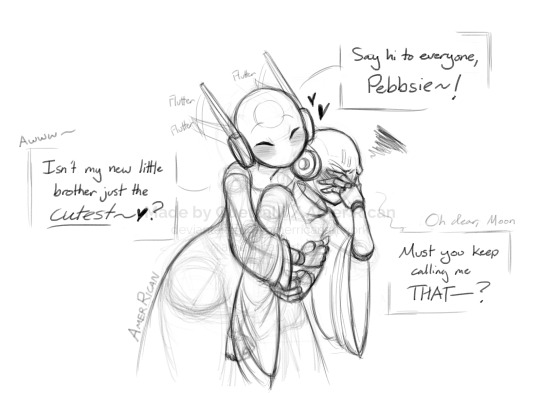
-.-.-.-.-.-.-.-.-
So firstly (and I plan to expand on this more later) I headcanon Five Pebbles is someone who cares a lot about his appearance, though not in a prissy or snooty sense and more in a “likes being the smartest and most sophisticated one in the room” sense. That means, more so than the average person, he generally doesn’t like being teased, ignored, belittled, condescended to, or otherwise disrespected, and very understandably so if you ask me! But it also means there exists a very special ability when it comes to interacting with Five Pebbles that almost no characters have.
It’s no more than the ability of someone to refer to Five Pebbles as “Pebbsie” while he’s in earshot without getting death-glares from him. Looks to the Moon, who first started using it, affectionately calls this ability “Pebbsie privilege”, and she ends up being one of the only characters who has it (besides Innocence, who in my portrayals eventually gets it too). Though even so, Pebbles originally got rather flustered when she called him that alone, much less in front of others, considering it's definitely a very cutesy nickname. In fact, poor Pebbles really didn’t like being called “Pebbsie” because one of his least favorite ways of being treated is like a child (which includes being thought of as "cute" in any way). This unfortunately happens to him a lot though since he’s part of the newest iterator generation and tends to have lots of uncommon ideas rarely taken seriously by the older models, and this treatment only amplified as he grew more stubborn and arrogant.
To elaborate on the origin, Moon developed the nickname pretty much on an impulse — quite a rare thing for her to act on actually — of wanting to hearken more to her role as “Big Sis Moon” and show love to her little brother. Soon after she started using it though Pebbles would pull her into private chats and urge her to drop it to save his dignity. Not wanting to hurt her brother in any way, it didn’t take long before she apologized and stopped using it, and basically got her "Pebbsie privilege" revoked. In the current time she secretly still likes calling him that in her mind, but knowing how much he dislikes it she always feels pretty guilty afterwards, despite them being no more than thoughts at that point. While not a major issue in-and-of itself, this situation was actually a small step in worsening a long-time fear Moon has, though that’s a headcanon for another day…
On a (marginally) more positive note however, after Moon’s collapse and the worsening of Five Pebbles’s rot, along with him generally reminiscing about the things he used to have (as part of yet more character headcanons I’ll elaborate on some other time), he actually began to grow fond of the nickname more and more. Yet he also couldn’t also shake the growing heartache the memories brang, as he came to see it as a reminder of his sister’s never-ending love for him and the better times he now regretted taking for granted and trying so hard to escape. While I headcanon he handles it differently in Downpour’s canon, in the worm-off-the-string AU story I’ve got so far, Moon slowly regaining her “Pebbsie privilege” and Pebbles appreciating it and no longer taking it so seriously (though he still forbids its usage in public) could serve as a small, yet sweet indicator of character growth for both of them.
-.-.-.-.-.-.-.-.-
Aaaand another RW headcanon done! I wanna mention, though, now that I’ve got more of an idea for the aforementioned AU I really want to start posting more of my headcanons for the Local Group, since the character interactions, histories, and ultimate character growth is perhaps one of the most important elements of that story so far. I’ve spent at least a couple weeks creating almost 40 pages worth of character notes, and while this particular one started out as just a little side-headcanon, I ended up tying it into all of that. Hopefully I can start sharing the main parts of these headcanons soon!
#art#artwork#sketch#drawing#digital#digital art#fanart#rain world#headcanons#rw headcanons#iterator#rw iterator#five pebbles#FP#rw fp#looks to the moon#LttM#rw lttm#quetzalli draws#quetzalli headcanons
330 notes
·
View notes
Text

Maria Robotnik: Joy as a Weapon
For a lot of my take on Maria, I understand that many people don’t have the same thoughts. And that is okay. But here is how Maria as a character is compelling to me.
Before the year of Shadow, we had very little Maria. Not that we have a lot right now, but it was much less a year ago. What little we did have of Maria has never been from her perspective, and this trend continues. Since her purpose in the story is how she affects Shadow’s character there’s no reason for her to be more than that. And yet, I find her important.
What we know from Shadow is that she was a kind hearted girl that supported him through his doubts and dreamed of going to Earth. Shadow was created to cure her and he held himself responsible for her death. But then you stop and think of what Maria actually experienced throughout her life, it’s both heartbreaking and profound.
In summary, Maria was pre-teen child, in space with her grandfather, who is experiencing a life debilitating diseases. She had an unknown family past (up until Generations), knew that a creature was made to cure her, and was aware that this creature—Shadow—would have a difficult future due to his alien origins. And through all of this, Maria Robotnik still stayed with a smile on her face, holding it all inside and using joy as her weapon of choice.
Now after Dark Beginnings and Generations, we have a better timeline on Maria’s life. Especially from Gerald’s journal.
She was the first born grandchild and granddaughter, alas she was cursed with the first born syndrome. We can assume this was why Gerald got extremely attached to his granddaughter as he writes that she will be his legacy.
During her childhood on Earth, she developed NIDS. Her family worked on finding a cure for her on Earth but nothing worked. Gerald insisted on taking her to space, and though it’s unclear how Maria felt about it, Gerald makes it clear that her parents were not keen on the idea. We have to assume that Maria trusted her grandfather, reassuring her parents that she would be back.
When Maria was first brought to the ARK there were no children, but she was adopted as the “granddaughter” of the ARK.
During her pre-teen years, Maria was experiencing multiple life-altering events that were out of her control, and yet, she remained joyful. She must’ve witnessed people argue, plans being arranged, and had to say goodbye to her family and the Earth she loved. Yet she stayed hopeful. Whatever her role as a patient in the NIDS trials aboard the ARK, she believed it would bring hope to humanity.
Years after she arrived, Abraham Towers was born aboard the ARK. For the first time in a long time, she was not the only child aboard the ARK. She developed an immediate bond with him—someone new, not burdened by the world’s responsibilities.
Her time on ARK was beneficial as she no longer experienced any visible effects of NIDS. Though she still had bad days, her hope remained intact. This is something her family, however, lacked.
Gerald, in his journal, states that he kept her in the dark about her family’s belief regarding her future.
“She has total faith in me. “Project Shadow” will heal her, she says.
Her family on earth has no such faith.
Her family wants her to make a full recovery or just come home.”
Which is understandable. She was taken because Gerald believed that he could cure her. He did everything in his power to get her to be as healthy as possible.
And Maria, being Maria, did what we have known her for: she became a reassuring and calming force for everyone around her. While she was physically unable to do much, her hope and happiness were all she had to give.
Her positivity comes with many challenges, including the arrival of her new "godson," Shadow. At first, she doesn’t know much about him, other than that he was created to help cure her, and that he’s the "ultimate lifeform" for the government. Another person for her to interact with. Years aboard the ARK, and now there’s someone new.
Knowing Maria, she must’ve read through countless notes on Project Shadow. He was created to cure her, but also to serve the government’s needs. And so, she gave him his first gift: his air shoes and limiters..
During this time in Gerald’s entries there is the understanding that the Robotnik’s homelife is also not the best. Gerald’s family is falling apart down on Earth and his pressure is growing immense, his only solace is the bright light his granddaughter brings to his lab.
Soon, Shadow is awakened for the first time. And it’s Maria’s duty to be his best friend, his guide, and his confidante for everything that will come his way. He may have just woken up 30 seconds ago but he needs to see everything and most importantly the Earth!
And between the time Shadow wakes up and future entries on Gerald’s journal the events of Shadow Generations take place.
During their time in the white space, Maria Robotnik learns about what her confidant’s life will entail. She meets a new Shadow. A Shadow who has great skills and undeniable anger for reasons she cannot fully understand. And he somehow looks at her, as all the other doctors back on Earth used to do. The look of condolence.
The holier than thou, so untouchable, so fragile, like a flower that could break at the slightest touch.
Ah, she can’t quite put it together but she knows. It has been time since he had last seen her. Her time finally ran out. But How? Who knows. But Shadow surely has gone through it.
Maria knows there must be more to everything than this. Shadow’s future does not seem bright and that’s where her job comes in: to bring hope to humanity. Shadow will show the way to that light. The only way to make that work is to support Shadow in all of his doubts. Make him know that he is okay. Be the emotional support her grandfather forgot to address.
And so, we return to their current time in the ARK. And her cure does not work. And Shadow’s stress increases and he falls into bouts of despair.
She distracts with hugs of support and stories of the Earth. The stars in the sky and the ocean down below. Life is meant to mean more than just one failed mission.
Yet she knows why he feels this way. Everything that is happening is because of her. Her parents had another child, because she was no longer in their life. Her grandfather was working himself to the bone because of her. Her Shadow was feeling despair because of her. Her grandfather exchanged the entirety of humanity to an alien race because of her and was hoping that Shadow would fix it because of her.
They record a video for Shadow. For when the Black Doom returns in 50 years and she will help him defeat the Black Arms. She doesn’t know how far in the future white space Shadow was from. If they continue to work on the cure she will be okay by then. She has to hope so.
Then a lab experiment went rouge. She must send Shadow to help. He will be able to fix everything and save grandfather.
Fast forward, she is running with Shadow down a hall during the ARK Raid. They need to get to safety. She feels a fierce pain in her chest. And so she frees the one person who had no reason to be involved in her mess. The one person who she will forever be held accountable for.
“Sayonara, Shadow the Hedgehog.”

Am I reading too much into a dead girl from a franchise about a blue hedgehog who runs to fast...of course I am. That's the whole deal.
94 notes
·
View notes
Text
An analysis on Anya (an Anya-lysis!)
As promised in my Twiyor season 1 wrap up post, it's time for me to give Anya time in the analysis spotlight – an "Anya-lysis" if you will! (yes, I've been waiting to make that pun!)
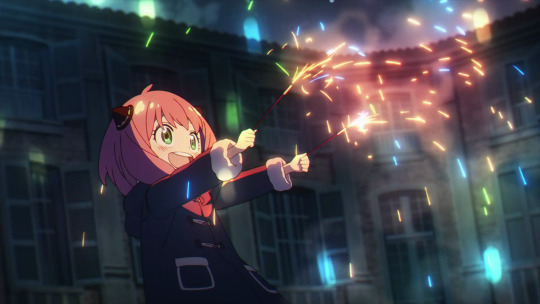
*I apologize in advance for the length of this post. I felt that splitting it into two would have hindered the flow of the analysis, so I kept it as one long post. But I promise it's not as long as it seems...the high number of images make it seem longer!*
Before I get into my analysis, I wanted to preface this post with a fantastic quote from @incomingalbatross, who perfectly describes the unique role Anya has in the series.
"Realizing that Spy X Family really is The Anya Show to me, and not just because "oh look, cute baby child" but because Anya is the center of the story. She has so many secrets resting on those tiny shoulders. She is juggling so many agendas. She's the one who knows everything and her choices drive the plot—she chose Twilight, she chose Yor, she chose Bond—and even when you look at the other characters and their relationships she IS the star they orbit around! Twilight and Yor's relationship is built on their shared care for Anya! And more than that, at the core of it all, Anya's goals are the ones we're invested in.
The center of this story isn't the superspy trying to do his job, or the assassin trying to do hers. It's the little girl who said "FAMILY" and pulled the building-blocks of one close around her with all her tiny strength, and everyone else in this story keeps being moved and changed and redirected by the force of Anya's attachments to her family.
And at the same time she is SO SMALL"
While Twilight may be the protagonist, and Yor the deuteragonist, Anya is definitely the main character in Spy x Family. Not only would there be no "family" without her bringing Twilight and Yor together, but her status as the main character is quite unique among shonen series, or even media in general.
Typically in stories where a little kid (like, below the age of 10) is the main character, either the majority of other major characters are also little kids, or the kid's main purpose is to be a cute comic-relief foil for the adults. But while there are kids Anya's age in SxF, the other important characters in the plot, namely Twilight and Yor, are not. So rather than the typical scenario of the main kid character constantly being surrounded by and working off their fellow kid characters, Anya is more often interacting with her adult parents. And it's not just for cutesy moments and comic relief – the true heart of SxF is about a fake family that could any minute be destroyed, with only little Anya being aware of this grim reality and doing everything she can to keep things together...all without the ability to be truthful with anyone, not with the adults or her fellow kids. While her parents are each secretly fighting for their own vision of world peace, Anya is too…the "world peace" of the family she doesn't want to lose. It really is a one-of-a-kind scenario for a little kid character.
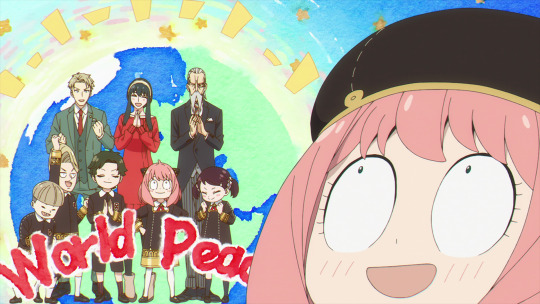
But having such a special main character role doesn't necessitate a well-written character. But in Anya's case, she definitely is. In fact, I think she's the most well-written little kid character I've ever seen.
Too often in media little kids are portrayed as being overly cutesy, overly bratty/whiny, and/or act much older than they should. A key factor in making a little kid character believable is that you can't just make them cute and/or emotionally immature...they have to also be weird. Anyone who's spent time with little kids knows all the weird stuff they say and do because of their less restricted child brains and ignorance about the world. A good example of this is Lilo from Lilo and Stitch (another well-portrayed kid character). The movie does a good job showing all the weird habits Lilo has, like the bizarre origins of her favorite doll, the freaky voodoo stuff she does to the local bullies, and how she totally buys the fact that Stitch is a dog. Likewise, Anya has tons of little endearing weirdnesses, starting with her wanting a spy dad and assassin mom simply because she thinks it's "cool," to the funny lingo she develops like "ooting" (odekeke) and "ohayou-masu" ("happy morning," a.k.a, an adorably incorrect way of saying "good morning"), to thinking it's acceptable to give George a leaf as a parting gift (then wanting it back later), to her comical remarks whenever she thinks Loid and Yor are being "flirty."

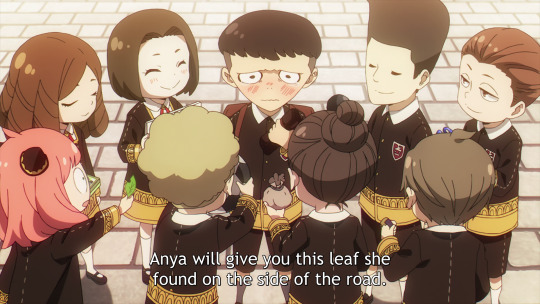
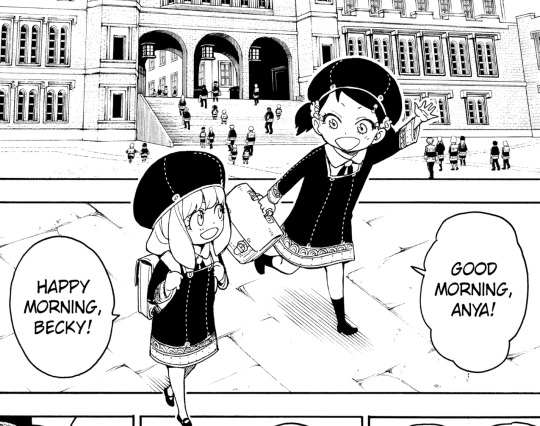

Another realistic aspect of Anya's character is the fact that she's not super-smiley and overly cheerful/bubbly like many other main character kids. Not that she doesn't smile and can't be cheerful, but her default expression is a look of uncertainty or wide-eyed cluelessness, which makes sense considering her upbringing (I'm talking about her default expression in canon, not in merch or other marketing as characters tend to always smile in these even if that's not their usual expression – just look at Yuri's merch!) Most of the time when other characters are talking, she looks perplexed, like she isn't sure what's going on but she's really trying to learn/understand.


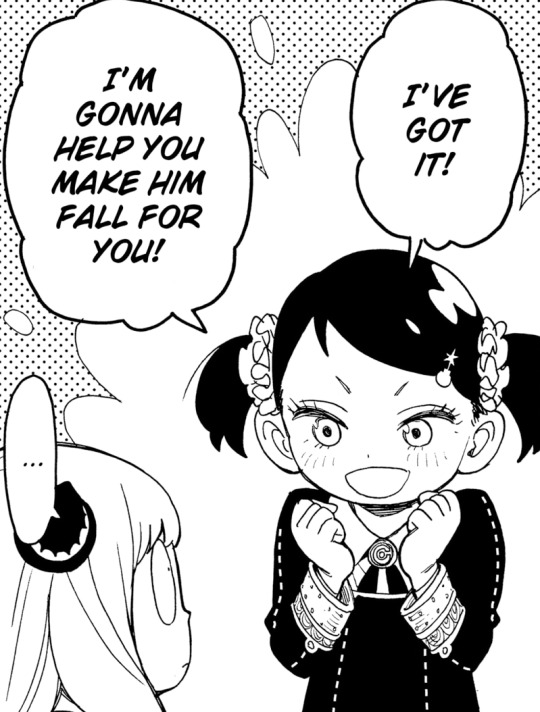
These expressions make more sense to me than a child who smiles all the time, because she's at an age where she still doesn't understand the right emotions to feel at the right time. A fantastic example of this is when she punches Damian – her face is totally blank! No anger, no fear, no embarrassment...because she still hasn't learned the proper emotions to feel in a situation like this.

All she knew was what Yor told her and that she was bothered by Damian's attitude. In fact, the iconic smug smile that she shows in that scene is the result of her not knowing how to properly react when faced with bullying (cry, get angry, etc).

Similarly, she has a very bored expression when all the kids are upset about George's plight, as if she doesn't really get what all the to-do is about. This also creates good contrast to how the other Eden kids from their rich families were probably forced to grow up fast, and thus act more like 8-10-year olds than the 6-year olds they're supposed to be. Meanwhile Anya, who's supposedly younger than them, stands out with her more childlike mannerisms.
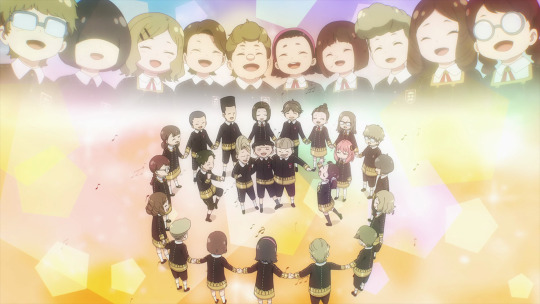
This all makes sense not just because she's still a little kid, but because her view of emotions has been skewed by the fact that she can read people's minds. So she has to not only learn the socially proper way to react to people's actions and words, but also when she should, or should not, react to what's on their mind. I believe this is why she has such a wide variety of expressions compared to the other characters – her mind reading has forced her to experience way more emotions at such an impressionable age, though not always with enough context and guidance to identify when they're socially acceptable to express.
There are way too many examples of Anya's incredible range of expressions, so I'll just have to pick a few!
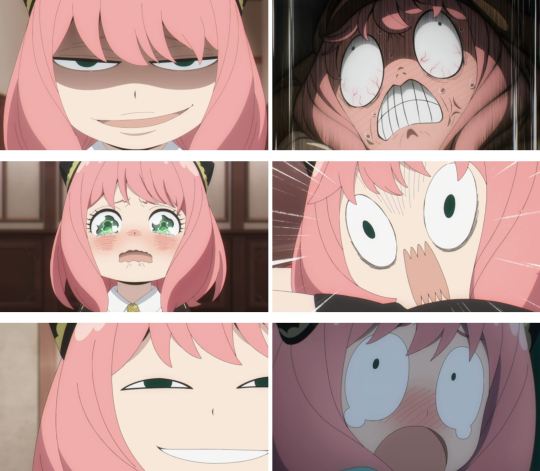
Put all this together – her childlike reactions to situations, but with a twist because she can read minds, plus her endless array of comical faces, and you have one of the funniest characters I've ever seen.
Because Anya has such a wide variety of expressions, and her default expression is that of uncertainty, there's a lot more meaning when she does smile. The shining smile she has when Loid praises her for getting a stella, when she plays with Bond for the first time, and when she meets up with Becky after their shopping trip, have a lot more significance because that's not an emotion she expresses all the time. Since happy/cheerful isn't her default mood, the emotional impact of scenes where she does smile is all the more stronger.
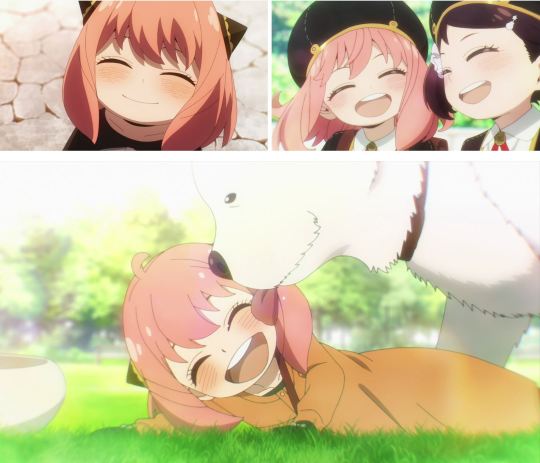
Likewise, considering her age, Anya isn't much of a crier either. Having a kid character burst into tears and throw temper tantrums is common, but the amount of notable times Anya has exhibited this behavior is relatively few. She did have a tantrum early on when Loid stopped her from going into his room and when she demanded that Bond be her dog…but those are the only notable cases in my opinion. She has shed tears here and there, but again, not a significant number of times. Similar to the scenes where she smiles, when she does cry (in a non-comical way), like when she's reminded about her mother at the Eden interview or when she's finally reunited with Yor after the bus hijacking, it has a lot more meaning.


Another common trait for little kid characters is that they're usually a representation of total purity and innocence. While Anya doesn't have the same dark ulterior motives and immoral occupations that the adults have, she's not shown to be a complete angel either. Even though good intentions are what drive her, she can be a manipulator, mischievous, and even cocky at times, like when she insists on being called' "Starlight Anya" after getting her first stella, when she was being overly competitive with Damian after the bus hijacking, when she was joking around on the bus after finding out the bombs were fake, and when she almost attacked Bond after he chewed up Penguinman. But all of these examples only serve to make her a more fleshed out character as opposed to just being the cutesy, happy series mascot all time.
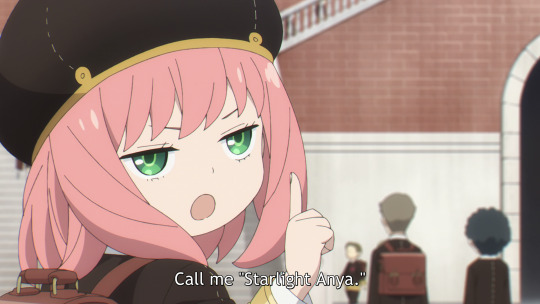

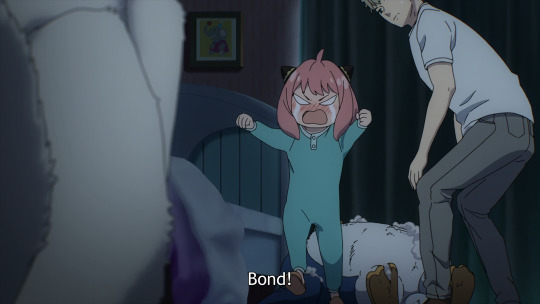
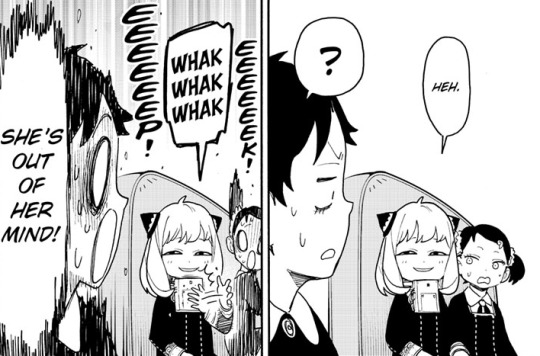
Obviously because of her mind reading powers, she manipulates the adults around her all the time, but again, there's never any malice involved…it's clearly the result of a little kid doing everything in her power to keep the happy family she's created. And due to her mind reading ability, she's learned to be much more proactive than reactive – she knows what people are going to do before they do it, and what their intentions are without them saying it. This has allowed her to become resourceful way beyond her years, which has led to her saving the lives of both Twilight and Yor on more than one occasion.

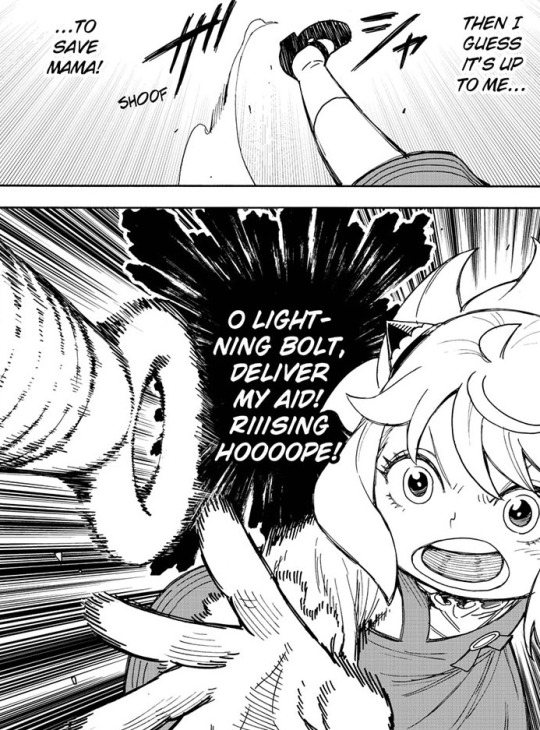
One emotion Anya does have an abundance of is empathy. Typically children don't start to develop empathy – the ability to understand and relate to the intentions and feelings of others – until a bit past Anya's age. But because of Anya's ability to read minds, it makes sense that this part of her development would take priority over something like proper speech and school smarts. Her empathy extends to all the adults around her, her fellow kids, and even animals. While a lot of her empathetic actions stem from her need to help keep Twilight's and Yor's identities secret and thus maintain the peace of the Forger family, there are many examples where this isn't the case and she's simply acting out of nothing but concern for others: comforting the Eden cow because she understood it was scared, worrying about the well being of the Project Apple dogs, leaping into action when she heard someone drowning, and comforting Damian when she knew he was scared during the bus hijacking.

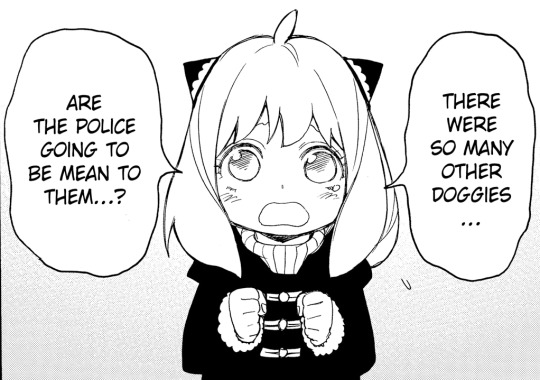
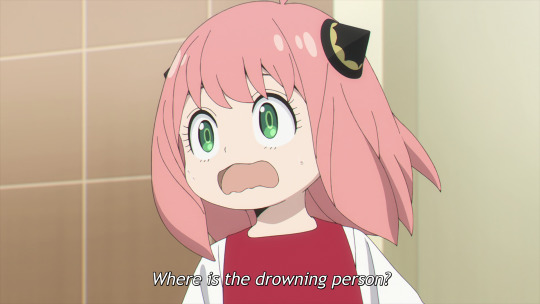

Even when identity reveals aren't at stake, she still comforts Twilight and Yor when they need it, like when she thought Twilight had a nightmare after his backstory reveal, and when she knew Yor was concerned about Loid's relationship with Fiona.

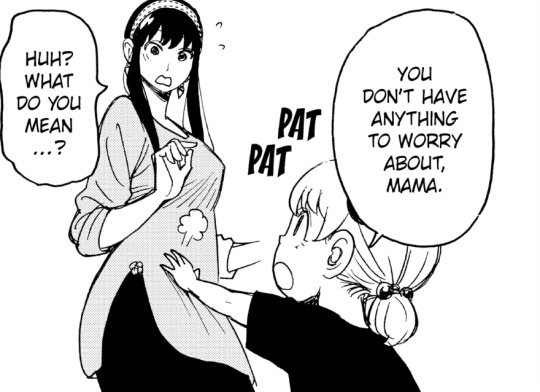
The bus hijacking was a prime example of Anya being empathetic, but not to an unrealistic degree. She empathized with Billy enough to diffuse the situation, but not on a deeper level because, again, she's a little kid. She understood he was upset, but she didn't have outpouring sympathy or deep, introspective thoughts about his situation – that's something an adult would do, not a little kid who's still learning what emotions to feel at what times. What she eventually does is something that makes perfect sense both for her personality and age. With some great resourcefulness on her part, she was able to figure out what she had to say to manipulate Billy the right way, but at the same time she was playing it by ear and basically clueless as to the depth of the matter, yet mustered up all the courage she could…typical Anya.
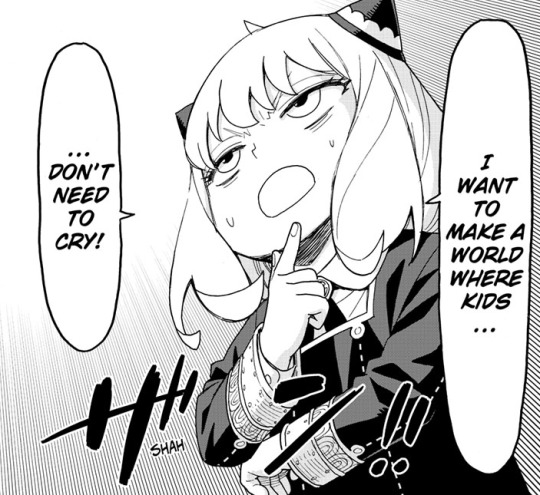
There are a lot more examples like this of Anya's sense of empathy, too many to list. But the bottom line is, although Anya does use her powers to manipulate people to benefit her own situation and those she cares about (who can blame her?) it's clear that even at such a young age, she's a genuinely good girl who wants to help others and do good in the world, even if she's too young to realize it yet. Not unlike her parents, really. I think we'll be searching a long time before we find another 1st-grade aged character as awesome as Anya.
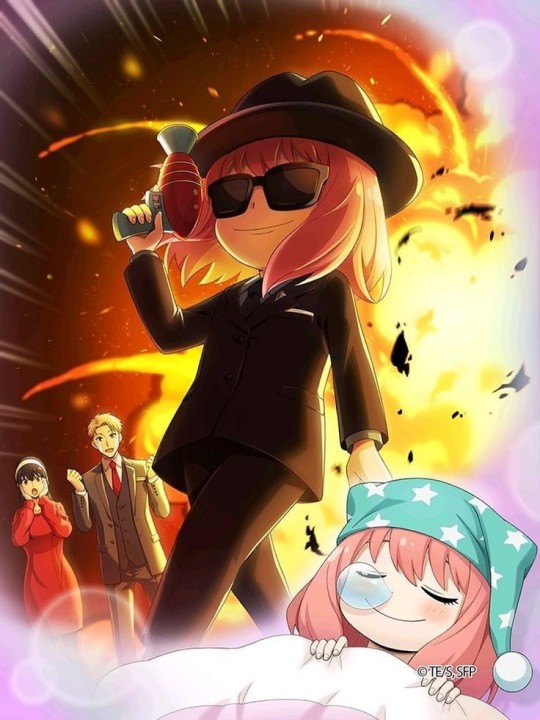
591 notes
·
View notes
Text
When Capcom sat down to write RE4make and Separate Ways, they had to have a moment of reckoning when it came to Ada's character:
Do they continue to write out her romance with Leon, or
Do they commit to her role as an ambiguous third party agent keeping her fingers in all of the pies?
They chose the latter. They chose the latter because it was more important, narratively. And they couldn't have both, because having both doesn't make any fucking sense and never has made any fucking sense.
Ada is a selfish character, at her core. To have her constantly be soft for Leon undermines that selfishness and makes her other actions not make any sense; if she cared that much about him, why would she continuously serve the bad guys that make his life a living hell? And the reverse is also true. Why would she care so much about Leon if all he does is get in her way and act as a distraction for her?
So anyone who complains that RE4make's Separate Ways didn't show Ada caring enough about Leon -- that was the point. They solidified her identity as a character by doing that.
The writers of the Remake series made a conscious decision to make Leon and Ada's interactions/relationship in RE2make serve an actual function/purpose for their characters instead of "uwu they're in love."
For Leon -- Ada taught him that the people opposed to him aren't always bad guys. She taught him the true lesson of "the road to Hell is paved with good intentions." He learned to trust that little voice in the back of his head that tells him "something's not right here." She also taught him that there's a way to do the right thing without following the rules -- and, sometimes, by breaking them entirely.
For Ada -- Leon taught her that being independent doesn't mean self-isolating -- because just looking out for herself and no one else actually resulted in her just keeping her head down and not asking questions, which screwed her over big time in the end. Leon didn't teach her love or compassion or empathy; he showed her that she was actually being just as naive as he was, just on the other side of the fight.
Basically, they both taught each other: QUESTION EVERYTHING. Because that was the one thing that neither of them did in RE2make until it was way, way too late.
And so, in RE4make/Separate Ways, Ada spends far less time and emotional energy worrying about Leon because she's actually taking the lesson he taught her to heart and she's questioning the people and circumstances around her in order to protect herself. That was the point of her early voiceover about how Raccoon City changed her perspective and made her start asking where her efforts were going and why she was doing what she was sent to do.
She doesn't ask questions for moral reasons. She asks them for selfish ones. Because Ada is an inherently selfish character.
On the boat, Leon asks Ada: "Are you just trying to use me again?" and Separate Ways answers and repeats over and over and over again: YES. The only reason she helps Leon in the village and at Mendez's house is so that he can continue being useful for her. Because Leon didn't teach her to care about people; Leon only taught her how to better take care of herself -- the same way she did for him.
This is a really damning exchange of words:
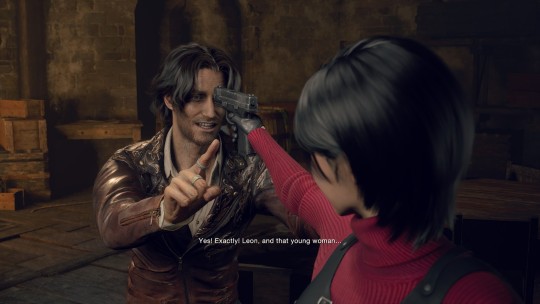

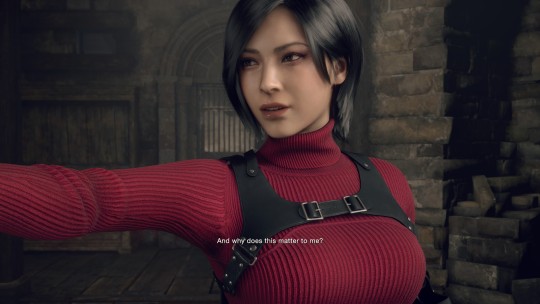
So, yes -- Ada is using Leon in RE4make. Yes, she only helps him because it benefits her. No, she genuinely doesn't care whether he lives or dies. Yes, she meant it when she told Leon to leave Ashley for dead, and yes, her sole reason for doing it was to get Ashley out of the way because Ada found Leon's new demeanor hot and she wanted to fuck him. No, she had no intention of taking Ashley with them on the chopper at the end -- because yes, her invitation to Leon was a bookend to her earlier offer for Leon to leave Ashley and go fuck her (Ada) instead.
And that's why Leon tells her to go fuck herself and shakes his head in utter disbelief when she asks if he's coming with her.
Because Ada is a selfish character.
I don't say this to hate on the character or even express dislike for her. This doesn't make her a bad character -- in fact, the opposite is true. It makes her consistent, which makes her a better written character overall from what/who she was in OG.
It also doesn't make her evil or a bad guy. Ada Wong is the most Chaotic Neutral character in the entire RE series -- even moreso than Billy Coen or Jake Muller ever were. She's in it for herself, and that particular approach is neither inherently morally good nor evil.
But Aeon is dead canonically in the Remake-verse. It was sacrificed in the name of bringing consistency and logic to both characters.
And that was the true point of the boat scene.
Neither of them have changed who they are at their most fundamental level. Leon is still the selfless hero, and Ada is still the selfish spy. Their relationship in RE2make served as a strengthening of those core traits -- not an erosion of them. Leon can better protect and save Ashley because of the lessons that Ada taught him, and Ada can successfully outmaneuver Wesker because of the lessons that Leon taught her.
But that doesn't change who she is. It doesn't change who either of them are. In fact, it only served to create a more authentic version of them both. Leon is more zealous in his heroism, and Ada is more committed to her own self-preservation and naked about her selfish intentions.
The only people in RE4make who changed who they were were Luis and Krauser. Luis for the better, and Krauser for the worse. And they both paid for it with their lives.
450 notes
·
View notes
Text
Ugh. I love the trope of a character living with a dead body in plain sight but isn’t mentally able to recognize it. Whether they be too young or they are so far gone that they can’t, it’s so. Horrific. Like the moment you REALIZE that there’s a dead body of a loved one just. Sitting there. And they’ve been living their life without missing a beat as it rots in the living room. Bonus points if they acknowledge it but as someone or something else. Like oh that’s not my dead aunt, she’s alive silly! Or oh aunties been sleeping.
They’re so out of it that someone literally DYING (especially when they played an important role in the characters life) that they don’t even notice. It doesn’t even concern them. They are SO wrapped up in they’re delusions and hallucinations (for the mentally deteriorating or disturbed trope) that the smell of a rotting body that only CONTINUES to smell worse doesn’t even hinder them enough to be concerned. To them everything is just fine and peachy. They don’t realize their mom slipped and broke her neck, and it’s not even they that they don’t or wouldn’t care, it could plausibly be that they aren’t CAPABLE of realizing this person is dead. they don’t want to. their mind completely reworks their reality so that she’s very much alive but sleeping, or on a trip somewhere. Or just literally hallucinates conversations with them. Ugh this one is just my personal favorite but.
Pr when a character is so young they don’t KNOW what death is or WHY their mom hasn’t gotten up in weeks, even months. They don’t understand why the house continues to smell worse and worse. They’re forced into taking care of themselves, to being their own adult while this person who was supposed to take care of them ‘sleeps’. I don’t like this one as much as the hallucinations one, because with this one the situation is less malleable and more specific. But it’s still so good. It means that the person who was taking care of them made them feel like they were supposed to do it themselves. They’re too scared to try and wake mom or even if they did try when it doesn’t work, they still don’t get someone else. It could either mean neglect, or oversheltering. It’s just them and mommy. The character either doesn’t trust other people or doesn’t even ASK them because how could they help? It’s just them and mommy. But mommy’s sleeping, so they have to be good so when she wakes up she’s rested and is proud! And on the flip side, the character could be scared and maybe doesn’t want their parental figure to wake up because then that means they get punished or maybe they have friends over or the parental figure just isn’t fun to be around. Loud, obnoxious, or maybe negative and constantly drunk, or maybe the kid doesn’t NOTICE they haven’t gotten up. They’re so independent at such a young age that they can get to school, they can get their own food, and when the food runs out that’s when they get a little concerned. But they’re still young. They don’t know how to long term problem solve or how to QUESTION what’s going on around them. The smell? just avoid it. The food? try to ration or get food from friends and school.
my favorite part is REALIZING that the character goes their daily life around something so horrible and rotting. You could probably tell something was off. Whether with the kid they were quiet or antisocial, maybe a little weird, or with the hallucinations character, you could tell they are a little off their rockers. You never EVER thought it was actually this bad. A dead body? Rotting? for weeks? how does someone let this happen? This poor person. This poor kid. Reality either something they avoid, or has become to make no sense. Reality is what the kid has been told. They were never told what death is or what to do.
It hurts so much more when it’s a character you’ve WATCHED become this way. You’ve seen them interact with their late loved ones before. You’ve seen them socialize somewhat functionally. You know who they actually are and you KNOW how much they cared for this person. But something happens. Or maybe nothing did. But they just grew more and more reclusive. As their mental state deteriorates, so did their living friendships. And the less and less people talked to them, the less and less they bothered to attach themselves to reality or anyone who really was. Then you finally get to see inside their mind, their house, and hope it’s not the worst case scenario. But as you turn the corner into a room or a stairway, you see. You see that it’s so so much more worse than you could have EVER thought. and i lostmy train of thoug
#writing#horror#horror writing#horror appreciation#writing inspiration#writing prompt#writbelr#whump#whump inspiration#whump prompt#whump angst#whump ideas#whump tropes#whumpblr#whump community#whump dynamics#writeblr#whumplr#whump account#writing horror#writing tropes#horror tropes#psychological horror
147 notes
·
View notes
Note
I've been a Guides fan for years but sometimes I still marvel at what an amazing character your Luke is. A character that is undeniably capable and dangerous, and who has a fair amount of darkness inside of him, who chooses to go about his life being not only kind, but friendly and warm in personality. As a trans guy I sometimes struggle with feeling like my demeanor isn't very masculine because I also like to be friendly and approachable, but having a character that walks that line (though obviously his cultural perceptions of masculinity are wildly different than mine) has really helped me.
Do I ever understand how you feel. Luke, when I’m writing him, has a few hard-and-fast rules, but one of the most important ones is that he is, always, on the side of the common people and the downtrodden. It’s, quite literally, what he was made for, and he takes it extremely seriously. So his commitment, however difficult, however inconvenient, is to be kind. Not necessarily nice, or sweet, or pleasant, but always kind. And yes, sometimes to be kind, he has to be cold and harsh and dangerous, but crucially, it’s only sometimes. The most common, effective, and easy way to be kind is often to be warm, respectful, and as open as one can be. Not a doormat, not a yes-man, not a fool, but simply kind and with a willingness to extend the grace of trust to almost anyone he meets. He trusts other people want to be good, to be kind, to have a pleasant interaction with him, and to not be needlessly cruel. He trusts other people on a vital and visceral level, not with his most inner secrets, not with his life, but with faith in their intent and desire to be good. And in acting on it, more often than not, it becomes a self-fulfilling prophecy. Another important one is that Luke, always, knows who he is and what he is. If he ever doesn’t, expect it to be a major crisis and not easily swept aside. Luke knows who he is, knows what he is, and in knowing, denies others the power to define him. He doesn’t care if he’s seen as more or less of a man, if he’s seen with respect and deference or scorn and hostility. Heck, he doesn’t even care if he is a “man” at all! He’s a Raqkesh, a Runner, a being made and not born, a purpose made manifest! What does he care if he obliges to some kind of arbitrary idea of gender? It’s not even his own! The Children have such a vastly different concept of gender to us that “manliness” isn’t even something that Luke fully understands. He goes by “he” because that’s what he was taught was his pronoun in Basic, and by now, he’s attached to it and regards it as his own, but it doesn’t mean the same thing to him as it would to you or I. Gender, to him, is what you do. You are the gender you are because of the role you decide to play in society, the functions you choose, and the affinities you have. You are a “woman” if you decide to dedicate to the ways of water and foraging, and a “man” if you dedicate to the ways of the sky and the hunt. Your pronouns aren’t who you are, but what your relationship is to the person you’re currently speaking to. You are “ach/ache” when you are speaking to someone innately more powerful to you, a spirit or other powerful individual. You are “kai/kair” when addressing your Home, your Kamir, and being addressed by them. You are “zar/zara” when being addressed by entities far more powerful than you. Your parents, guardians, or mentors are “sha/shara.” Who you are, who you are said to be, changes with the situation, and pronouns are as static as a person themselves.
Luke isn’t a man as we understand, he is, in his own mind, a myriad of genders and roles and purposes that make up him in his entirety. What does he care if others think him less of a man? He doesn’t even put value in that idea to begin with, or for that matter understand it. It’s not his purpose to be a man, not as far as he’s concerned. It’s not who he is, and no matter what other people may insist, he knows himself true. He knows who he is, what he is, what he’s here for. He knows, down to his bones, what his purpose is in the world. Nothing can shake that from him, or deny him that knowledge. So he acts, knowing who he is, and thus has an identity that cannot be taken from him or denied. And if that isn’t manly, well... what is?
89 notes
·
View notes
Text
Don and her Identities
So there's a lot of theories and whatnot rolling around about what the reveal means, what it means for Don's character, and what it can mean for the future. But I'd like to take a lens back and see how it changes something fundamental to Don, because every sinner has identities, but none of them are as...drastically affected by what their Canto reveals as Don.
Spoilers under Cut
From here on out I'm referring to "Don Quixote?" as Bloodon for short. Also read @thelordofhats post about Murder on the W Express as I think they have a lot of good thoughts about Bloodon and the event in general.
Bloodon is present in the mirror worlds. We know that from Don having Rocinante in every one of them, including more armored groups like Hammer Und Nagel and T Corp. Wouldn't make sense for her to keep them otherwise. However Bloodon doesn't seem to change a lot about how we view the identities, but I'd like to posit that she makes a world of a difference in understanding Don's position in the world and why she is where she is in mirror worlds. Because there's something VERY specific that seems to clash ALL OTHER MIRROR WORLD DONS from LIMBUS DON. Rule following. In almost every other identity, Don is seen following the rules of some wing or finger or even the head itself as a general fixer. The most notable thing to point to is she isn't a part of the group most against rules, the TLA, unlike fellow problem children Ishy and Heath. We never see a "Kurokumo Hong Lu" situation where she's called out for bending or breaking the rules of those she works under. This is all despite her constantly doing it under Limbus Company (at least until Vergilius tells her to back off) Why is this? I believe it has to do with Bloodon's priorities when it comes to the Don we know and love.
First and foremost, keep her alive.

We've yet to see a sinner's backstory specifically call out Dante like this. Almost as if Dante was part of the contract for Don Quixote. It wouldn't make sense for her to say they were promised. Why Dante was part of the contract is important is up to interpretation. It's possible there's something more, that Bloodon is more aware of the stars like Demian, she wants Don to completely override her, or she is simply scared of death. Either way, she needs to live for long enough to see some change for herself and Don. Thus, she needs both of them alive, hence her primary goal being that.
Secondly, she wants happiness. Lust isn't her base ego's affinity for now reason. It's likely a core part of both Don and Bloodon. If Bloodon is miserable, then it's likely she wants to help herself out of that pit somehow. Likely by making her other self happy in ANY way.
We can see this manifest throughout the mirror worlds and how Bloodon is trying across them. In each world, Don has something she can say she is happy about. Let's go over a few key ones and the way the two rules interact.
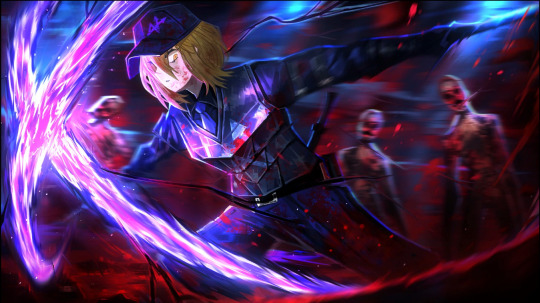
W Don! Everyone's favorite depressed and OP don. Bloodon likely setup Don's role in W Corp because of her love of the Warp Trains and the company itself. It seems like a slam dunk. Secure meal everyday, safety being a employee of a wing, and Don is happy! But when Don learns the truth, she becomes far less happy about her position. However, leaving her job is extraordinarily dangerous, if not lethal outright. To leave her Wing means death for a mere fraction of a chance of finding more happiness. Aside from her second uptie chat, she is also quite happy in all of her voicelines, and we don't really get to see how she evolves and adapts to the reality of her otherwise comfy job. It's a bit rough, but Bloodon has to keep her alive, and being a W employee is a pretty safe gig (up until something goes wrong :)
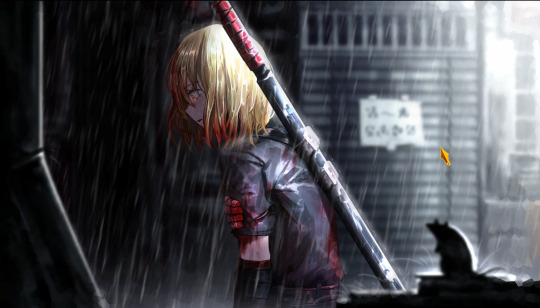
The above mentality also applies well with T Corp and Shi. While Shi is a bit less safe, she's still a director of a numbered Fixer association. She's still fairly comfy, and most of her angst comes from her subordinates suffering and having to take the lives of random individuals (something she also suffers with in T Corp).
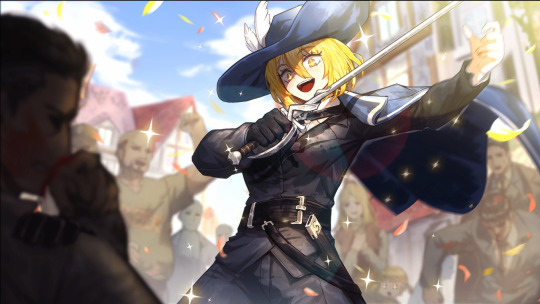
As for ones where everything aligns, we have plenty of examples of that. Middle, Lantern, and N Corp Don all are examples of Don being perfectly happy regardless of the morality or duties her job entails, as long as it's presented to her fantasies well. However, all of them still have her following some kind of rules, whether it be the Middle's or the Corps. It's very possible a Don without a leash in the form of Bloodon informing things could very easily fuck it up, and even if Don gets her dream job as a Cing director, she still can't save everyone she wants.
All of these identities illustrate the point that Don can't have it all. Risking her life for civilians means putting her neck on the line, and it's something Bloodon in the mirror worlds isn't setting up for her.
However, it's something Limbus Company can help her with. She can achieve her dreams of being a genuine hero in Limbus Company, because Limbus Company has solved many a problem for many a person. They've saved countless lives from the Time Ripper, helped resolve the distortion that is Papa Bongy, and slain the Pallid Whale. She can be the hero she dreams of...as long as she has enough power.
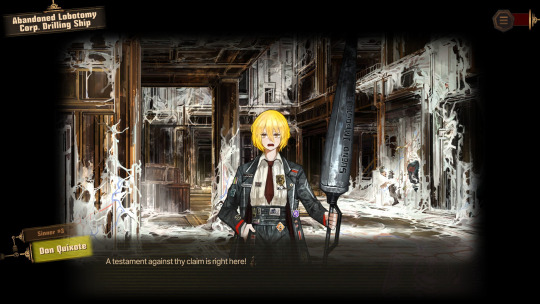
Consistently, Don has been shown that she can't make it in time or have enough power to save those she wants. We see it most prominently in her desire to save Pilot's crew, where the very laws of the ocean dictate that she did not make it in time. We also see it far more clearly the 'lacking' power in the Warp express.
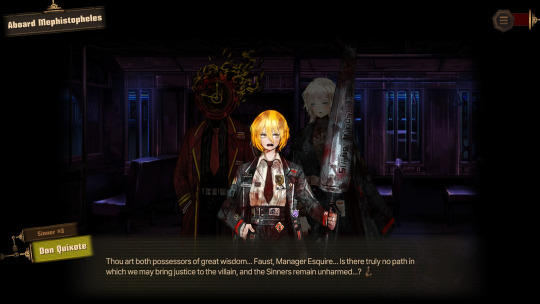
She so badly WANTS to fix things. She's willing to sacrifice a thousand times over to make sure villains die and the innocent survive. But in this instance, and many others, she can't.

But someone else did. Bloodon was able to salvage the situation Don couldn't. And that's what I think Canto VII will be about.
The fact that, in order for Don to be consistently happy, she needs help to fight the fights she doesn't have a hope of winning. The fact that, in order for Don to build her future, Bloodon has to face the fears that her powers are a part of them both. Afterall, who ate that Warp employee hiding in the secret compartment?
#limbus company#don quixote (lcb)#don quixote#analysis#character analysis#murder on the warp express#limbus spoilers#holy fuck this was a long post but honestly don is my hyperfixation and doing this gave me a deeper appreciation for her#she tries so hard#all she needs is that extra oomph from being a heavy hitter in the pmoonverse
76 notes
·
View notes
Text
If there was one thing I could tell every white fan who writes meta and fic about OFMD, it's that there's no way to do a "race-blind" reading of a story.
The simple fact of the matter is that our biases about race impact how we interact with every single piece of media we'll ever consume, and that's true for every person on the planet. We're all of us informed by the racism of the societies we grow up in, and we always all need to do the (often uncomfortable) work of examining why we think the way we do about characters of color. This isn't just important for making fandom feel like a safe space for fans of color, these are important life skills to build to help you become a better ally.
An important thing to remember is that you don't have to explicitly mention Ed's race to unintentionally reinforce racist readings of the text. Racist takes very often don't look like "Ed is obviously super violent and angry because he's brown," they more often look like "Ed is inherently violent" while ignoring how white characters like Stede engage in violence with much more enthusiasm. Trying to avoid thinking or talking about Ed's race doesn't mean you're less likely to accidentally reinforce racist takes - it in fact means you're more likely to do that because you're not taking the time to examine your biases!
Ed's race became an important part of the story the moment a Jewish-Māori man was cast in the role. While for a character like Stede the idea of being seen as threatening might even feel empowering (he's a gnc white gay man who has often be made to feel weak and useless), for Ed you will miss part of why the Blackbeard caricature feels so dehumanizing to him if you ignore the racial component. The way Ed is depicted in Blackbeard posters, the way he's exoticized at the party boat, his interactions with other characters - it's impossible to understand Ed's character without considering how the color of his skin impacts how he moves through the world. Moments like Izzy essentially buying Ed from the crown become much more troubling when you take the time to examine the text with Ed's race in mind, and you might even end up with reductive ideas about Ed's gender expression and relationship to masculinity if you fail to consider that things such as longer hair are ways that some Māori men like Ed express their masculinity. You can ignore that Ed's a man of color, sure, but then you're missing a lot.
At the end of the day, it's just important to take the time to sit with yourself and think about how you understand characters of color in the media you enage with. It's good and healthy, I think, to ask ourselves uncomfortable questions. Do you find yourself assigning Ed's violent actions more weight than those of characters like Stede or Izzy? Is it easier to ignore Ed's tears to focus on what he's done wrong? A common example is the moment when Ed orders Fang to skin the racist French captain with a snail fork - do you find yourself thinking that Ed overreacted?
128 notes
·
View notes